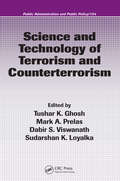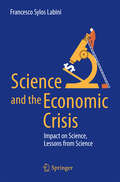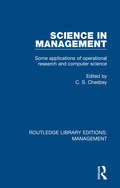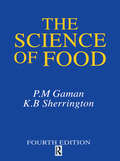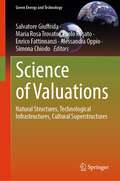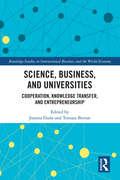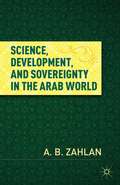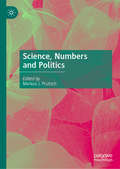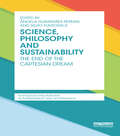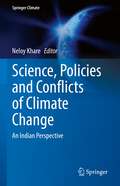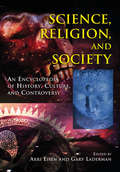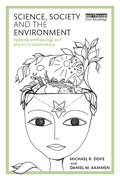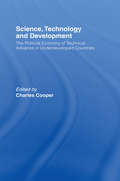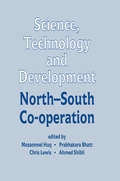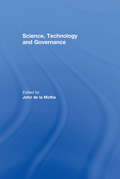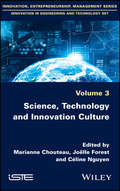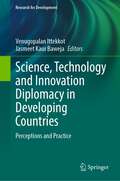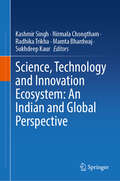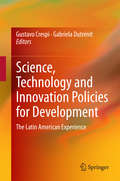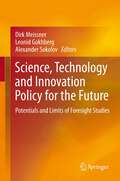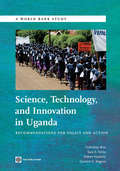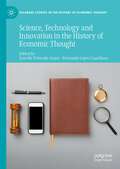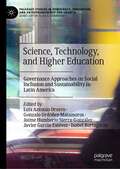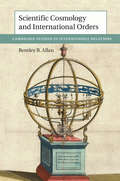- Table View
- List View
Science and Technology of Terrorism and Counterterrorism (Public Administration and Public Policy)
by Thomas M. HaladynaTraditionally, resources on terrorism and counterterrorism tend to focus on the social, behavioral, and legal aspects of the subject, with minimal emphasis on the scientific and technological aspects. Taking into account these practical considerations, the second edition of Science and Technology of Terrorism and Counterterrorism discusses the natu
Science and the Economic Crisis
by Francesco Sylos LabiniThis book not only explores the ways in which theeconomic crisis and associated austerity policies have adversely impacted thephysical and human infrastructure and conduct of scientific research, but alsoconsiders how science can help us to understand the crisis and provide originalsolutions. Starting with a detailed but accessible analysis of the scientificmethod and the nature of scientific prediction, the book proceeds to addressthe failure to forecast the economic crisis and the origins of the continuinginertia in economic policy and theory. Attention is drawn in particular to theshortcomings of neoclassical economics in terms of its description of theeconomic system as being mechanical in nature and characterized by equilibrium. This perspective mirrors the limitations and outdated ideas of nineteenthcentury physics, which the book contrasts with the insights offered by modernphysics. The impact of neoliberal ideologies on scientific research is alsodiscussed in detail, highlighting their stifling effect on innovation anddiversification. In closing, the book emphasizes the need for stateintervention to guide and support scientific research as the core engine ofeconomic development that will deliver a sustainable future.
Science in Management: Some Applications of Operational Research and Computer Science (Routledge Library Editions: Management #22)
by C. S. ChedzeyOriginally published in 1970. Management consultants in the United Kingdom are often accused of cloaking their activities in secrecy. The confidential nature of consulting work often precludes the publication of case examples and it is only occasionally that press reports appear summarizing particular studies. Consulting firms, however, are in the unique position of gaining experience over the whole range of industry, commerce and government, and consequently have a full opportunity for spear-heading new developments and gathering technical know-how of wide value to managers. Science in Management outlines the methods used by a consulting firm specializing in operational research and computer science and describes numerous case examples taken from a wide range of industries and from the public sector. These examples cover tactical problems, problems which overlap functional boundaries within a company and a few major projects of a strategic nature. The aim of the twenty contributors has been to explain in relatively simple terms, some of the more important techniques and to illustrate by practical examples, the wide scope of the management science approach at all problem levels. The book will be helpful to all those seeking to apply science in management. It is written primarily for managers and those studying modern management methods, but parts of the book will be of interest to specialists as well.
Science of Food: An Introduction To Food Science, Nutrition And Microbiology
by K. B. Sherrington P. M. GamanFirst Published in 1998. Routledge is an imprint of Taylor & Francis, an informa company.
Science of Valuations: Natural Structures, Technological Infrastructures, Cultural Superstructures (Green Energy and Technology)
by Alessandra Oppio Enrico Fattinnanzi Paolo Rosato Simona Chiodo Salvatore Giuffrida Maria Rosa TrovatoThis volume collects the best papers presented at the 2019 Conference SIEV (Italian Society of Appraisal and Valuation) on the Science of Evaluation foundations, actuality, and prospects. The book consists of twenty-six papers and is organized into four parts: the first one collects reflections on the nature of the value judgement, on the truth of the evaluative statement, and on the authenticity its contents, the values; the next three present operational experiences in the three fields of natural, urban and cultural heritage where the knowledge of the value of the human space, supports decisions and policies, highlighting feature concerning: value and valuations in the dialectic between earth and the city; the value bearers between heuristic and normatively; the role of valuation for the complementarity of rules and creativity. The book is being published in the midst of the new radical transformations of the equilibrium between social system and environment generated by the serious and unexpected crises of the third decade of this century. Reflections on the reality that fills evaluative statement with truth – the reality of values – is more topical than ever in a historic phase in which the role of democracies and the destiny of civil coexistence is called into question, claiming the order of unamendable values like truth, justice and beauty. The book brings together experiences that focus on the “intentional evaluative consciousness” as a condition for the responsibility of the subject - individual and collective - concerning the saliences and urgencies most significantly contributing to the formation of orderly communities.
Science, Business and Universities: Cooperation, Knowledge Transfer and Entrepreneurship (Routledge Studies in International Business and the World Economy)
by Joanna Duda Tomasz BernatCooperation between science and business (S2B cooperation) is a very important issue from the points of view of the domestic economy, companies, and universities. This is mainly because such cooperation is a catalyst for faster and reliable development – not only of enterprises, but also of the entire economy. Thanks to S2B cooperation, enterprises can gain and commercialize new and ground-breaking solutions. Universities in turn can give their research a more practical dimension to increase its economic applicability, which helps universities prepare future staff to work in modern enterprises. The aim of this publication is to indicate how cooperation between universities and business can be implemented in an international dimension. It shows the role of modern universities in supporting the development of enterprise and entire economies as well as the role of modern enterprises that use resources located in universities (including knowledge resources). This unique combination has a positive impact on the results and developmental opportunities for each of them. Any potential obtained in this manner is the basis for creating a competitive advantage on the market. This book is devoted to a specific area of cooperation between enterprises and universities and will be of interest to researchers, academics, practitioners, and students in the fields of entrepreneurship, knowledge management, international relations, and higher education.
Science, Development, and Sovereignty in the Arab World
by A. B. ZahlanZahlan's detailed study examines recent and current performance of Arab countries and their organizations in scientific research in relation to their socio-economic development. It shows that the Arab countries are severely handicapped by a political economy dominated by technological dependence, corruption, and limited research collaboration.
Science, Numbers and Politics
by Markus J. PrutschThis study explores the dynamic relationship between science, numbers and politics. What can scientific evidence realistically do in and for politics? The volume contributes to that debate by focusing on the role of “numbers” as a means by which knowledge is expressed and through which that knowledge can be transferred into the political realm. Based on the assumption that numbers are constantly being actively created, translated, and used, and that they need to be interpreted in their respective and particular contexts, it examines how numbers and quantifications are made ‘politically workable’, examining their production, their transition into the sphere of politics and their eventual use therein. Key questions that are addressed include: In what ways does scientific evidence affect political decision-making in the contemporary world? How and why did quantification come to play such an important role within democratic politics? What kind of work do scientific evidence and numbers do politically?
Science, Philosophy and Sustainability: The End of the Cartesian dream (Routledge Explorations in Sustainability and Governance)
by Angela Guimaraes Pereira Silvio FuntowiczFor science to remain a legitimate and trustworthy source of knowledge, society will have to engage in the collective processes of knowledge co-production, which not only includes science, but also other types of knowledge. This process of change has to include a new commitment to knowledge creation and transmission and its role in a plural society. This book proposes to consider new ways in which science can be used to sustain our planet and enrich our lives. It helps to release and reactivate social responsibility within contemporary science and technology. It reviews critically relevant cases of contemporary scientific practice within the Cartesian paradigm, relabelled as 'innovation research', promoted as essential for the progress and well-being of humanity, and characterised by high capital investment, centralised control of funding and quality, exclusive expertise, and a reductionism that is philosophical as well as methodological. This is an accessible and relevant book for scholars in Science and Technology Studies, History and Philosophy of Science, and Science, Engineering and Technology Ethics. Providing an array of concrete examples, it supports scientists, engineers and technical experts, as well as policy-makers and other non-technical professionals working with science and technology to re-direct their approach to global problems, in a more integrative, self-reflective and humble direction.
Science, Policies and Conflicts of Climate Change: An Indian Perspective (Springer Climate)
by Neloy KhareThis collection of articles captures and disseminates contemporary perspectives on climate change from an Indian context. Starting with an argument on a new climate deal which highlights the importance of policies and regulations within the climate change debate, some of India’s best-known geologists, meteorologists, climate scientists and archaeologists have put forward their concerns and convictions in this collection. The book covers articles on climate change scenarios, impacts, policies, regulations and protocols as well as geopolitical and geoeconomics implications of climate change over the Indian sub-continent including climatogenic vulnerability analyses of sea level rise (SLR) and crop production assessment. The geological perspectives of climate change over the Indian sub-continent are covered, along with highlighted climate impacts on the chemical weathering and maturity of sediments as well as on the manganese mineralisation in manganiferous quartzite in the Boringpadar-Amath area. The evolution of the monsoon, the most significant event of tropical belt is addressed through lake’s and river’s sediments, assessing the anthropogenic influences. Climatic conditions reconstructed through Quaternary alluvial sediments as proxy indicator of past climatic conditions over the Indian sub-continent are presented. There is also a separate chapter on the role of cosmic radio nuclide in paleoclimatic reconstructions. The inter-relation of climate change and tectonics over the Indian sub-continent is also covered, while the geopolitics on the conflicts of climate change have been discussed in the larger perspective of the South-Asian region.
Science, Religion and Society: An Encyclopedia of History, Culture, and Controversy
by Gary Laderman Arri EisenThis unique encyclopedia explores the historical and contemporary controversies between science and religion. It is designed to offer multicultural and multi-religious views, and provide wide-ranging perspectives. "Science, Religion, and Society" covers all aspects of the religion and science dichotomy, from humanities to social sciences to natural sciences, and includes articles by theologians, religion scholars, physicians, scientists, historians, and psychologists, among others. The first section, General Overviews, contains essays that provide a road map for exploring the major challenges and questions in science and religion. Following this, the Historical Perspectives section grounds these major questions in the past, and demonstrates how they have developed into the six broad areas of contemporary research and discussion that follow. These sections - Creation, the Cosmos, and Origins of the Universe; Ecology, Evolution, and the Natural World; Consciousness, Mind, and the Brain; Healers and Healing; Dying and Death; and Genetics and Religion - organize the questions and research that are the foundation of the enormous interest, and controversy, in science and religion today.
Science, Society and the Environment: Applying Anthropology and Physics to Sustainability
by Michael R. Dove Daniel M. KammenIn an era when pressing environmental problems make collaboration across the divide between sciences and arts and humanities essential, this book presents the results of a collaborative analysis by an anthropologist and a physicist of four key junctures between science, society, and environment. The first focuses on the systemic bias in science in favour of studying esoteric subjects as distinct from the mundane subjects of everyday life; the second is a study of the fire-climax grasslands of Southeast Asia, especially those dominated by Imperata cylindrica (sword grass); the third reworks the idea of ‘moral economy’, applying it to relations between environment and society; and the fourth focuses on the evolution of the global discourse of the culpability and responsibility of climate change. The volume concludes with the insights of an interdisciplinary perspective for the natural and social science of sustainability. It argues that failures of conservation and development must be viewed systemically, and that mundane topics are no less complex than the more esoteric subjects of science. The book addresses a current blind spot within the academic research community to focusing attention on the seemingly common and mundane beliefs and practices that ultimately play the central role in the human interaction with the environment.This book will benefit students and scholars from a number of different academic disciplines, including conservation and environment studies, development studies, studies of global environmental change, anthropology, geography, sociology, politics, and science and technology studies.
Science, Technology and Development
by Charles CooperPublished in the year 1973, Science, Technology and Development is a valuable contribution to the field of Economics.
Science, Technology and Development: North-South Co-operation
by Mozammel HuqFirst Published in 1992. Routledge is an imprint of Taylor & Francis, an informa company.
Science, Technology and Global Governance (Science And Technology In The Ipe Ser.)
by John R. De La MotheFirst published in 2001. Routledge is an imprint of Taylor & Francis, an informa company.
Science, Technology and Innovation Culture
by Joelle Forest Marianne Chouteau C¿line NguyenWe are facing unprecedented challenges today. For many of us, innovation would be our last hope. But how can it be done? Is it enough to bet on the scientific culture? How can technical culture contribute to innovation? How is technical culture situated with regards to what we name collectively the culture of innovation? It is these questions that this book intends to address.
Science, Technology and Innovation Diplomacy in Developing Countries: Perceptions and Practice (Research for Development)
by Venugopalan Ittekkot Jasmeet Kaur BawejaThis book provides a developing country perspective on the internationalization of science and the role of Science, Technology and Innovation Diplomacy (STID) in leveraging scientific cooperation for sustainable development. In articles by individuals from government departments and academic & research institutions in nine developing countries, it provides a conceptual understanding of the subject and reveals the prevailing perceptions on its praxis/practices. The articles highlight the significance of international cooperation at bilateral, regional and multilateral levels and the need for strengthening the role of STID in foreign policy and strategies of governments. The book is a useful reference material to government officials, diplomats,academicians, researchers, science counsellors, international relations experts, science and technology professionals and other stakeholders from the developing countries and transition economies, dealing with economic and developmental policy issues and/or science, technology and innovation (STI) issues in understanding the praxis and prospects of STID. The book is also useful for scholars and international relations experts from developed countries in understanding STI and related issues that affect the relationship of developing countries and transition economies with their partners from the developed world.
Science, Technology and Innovation Ecosystem: An Indian and Global Perspective
by Nirmala Chongtham Kashmir Singh Radhika Trikha Mamta Bhardwaj Sukhdeep KaurScience, Technology, and Innovation (STI) are the key drivers of the economy and development of a country. The economic and social impacts of STI require a deep understanding of the STI ecosystem, which includes the interactions between actors, their technologies, and their business models. This book, "Science, Technology, and Innovation Ecosystems: A National and Global Perspective," focuses on the STI ecosystem of India in comparison to other innovation-backed global countries. It will include a study of the entire STI ecosystem, focusing on the system interconnectedness required for strengthening it. The building of interconnection within actors of the STI ecosystem is one of the paramount requirements to reinvigorate the STI ecosystem as a whole. The book will also present the crucial role of STI in bringing socio-economic development from a national and international perspective. It addresses the development of viable solutions for a sustainable future and a positive societal transformation with the help of innovative science-based approaches. This book showcases the future of science in terms of emerging frontier and strategic technologies, giving us a snapshot of future STI efforts worldwide. Emphasis is given to the policy directives and program interventions backed by evidence to revamp the STI system by addressing the societal and economic needs of the country. The book will strategically bring the concept of the relevance of the Intellectual Property (IP) ecosystem in building the country’s innovation capacity along with specific pieces of evidence on how the IP system should be roped in to bring higher innovation efficiency. An insight is provided to chart out the pathway for creating a knowledge-based economy focusing on knowledge production to knowledge consumption through knowledge diffusion.
Science, Technology and Innovation Policies for Development
by Gustavo Crespi Gabriela DutrénitThis book examines the implementation of science, technology and innovation (STI) policy in eight Latin American countries and the different paths these policies have taken. It provides empirical evidence to examine the extent to which STI policies are contributing to the development of the region, as well as to the solution of market failures and the stimulus of the region's innovation systems. Since the pioneering work of Solow (1957), it has been recognized that innovation is critical for economic growth both in developed and in less-developed countries. Unfortunately Latin America lags behind world trends, and although over the last 20 years the region has established a more stable and certain macroeconomic regime, it is also clear that these changes have not been enough to trigger a process of innovation and productivity to catch-up. Against this rather grim scenario there is some optimism emerging throughout the region. After many years of inaction the region has begun to invest in science, technology and engineering once again. Furthermore, after many changes in innovation policy frameworks, there is now an emerging consensus on the need for a solution to coordination failures that hinder the interaction between supply and demand. Offering an informative and analytic insight into STI policymaking within Latin America, this book can be used by students, researchers and practitioners who are interested in the design and implementation of innovation policies. This book also intends to encourage discussion and collaboration amongst current policy makers within the region.
Science, Technology and Innovation Policy for the Future: Potentials and Limits of Foresight Studies
by Leonid Gokhberg Dirk Meissner Alexander SokolovThe book gives practical guidance for policy makers, analysts and researchers on how to make the most of the potential of Foresight studies. Based on the concept of evidence-based policy-making, Foresight studies are common practice in many countries and are commonly understood as a supportive tool in designing future-oriented strategies. The book outlines approaches and experiences of integrating such Foresight studies in the making and implementation of science, technology and innovation (STI) policies at different national levels. It delivers insights into practical approaches of developing STI policy measures oriented towards future societal and technological challenges based on evidence drawn from comparable policy measures worldwide. Authors from leading academic institutions, international organizations and national governments provide a sound theoretical foundation and framework as well as checklists and guidelines for leveraging the potential impact of STI policies.
Science, Technology and Innovation in Uganda
by Sukhdeep Brar Robert Hawkins Sara E. Farley Caroline S WagnerScience, Technology and Innovation in Uganda is part of the World Bank Studies series. These papers are published to communicate the results of the Bank's ongoing research and to stimulate public discussion. This study presents a unique methodology to view science, technology and innovation (STI) in developing countries. The study provides a set of cases studies drawn from a diverse range of experiences across the Ugandan private sector and offers concrete policy recommendations on how to support broader development of STI in Uganda. The study finds that of all the STI challenges facing firms, universities, and public research organizations in Uganda, the barriers to collaboration and communication are the most urgent in terms of STI priorities to address in the coming years.
Science, Technology and Innovation in the History of Economic Thought (Palgrave Studies in the History of Economic Thought)
by Estrella Trincado Aznar Fernando López CastellanoThis book provides an overview of the importance of science, technology, and innovation in the history of economic thought. It charts how science has responded to societal needs and global challenges to highlight the way in which knowledge and technology have been used to benefit society. Particular attention is given to modern concerns, such as climate change, technological unemployment, and social unrest, which are contextualised within the work of the Scottish Enlightenment, Marx, Weber, and Schumpeter. Broader debates, including the relationship between invention and economic development, the alienation of labour, and institutional change, are also considered. This book aims to shed new light on our understanding of science, technology, and innovation by placing them within ideas from the history of economic thought. It will be relevant to students and researchers interested in the history of economic thought and the economics of innovation and technology.
Science, Technology, and Higher Education: Governance Approaches on Social Inclusion and Sustainability in Latin America (Palgrave Studies in Democracy, Innovation, and Entrepreneurship for Growth)
by Gonzalo Ordóñez-Matamoros Luis Antonio Orozco Jaime Humberto Sierra-González Isabel Bortagaray Javier García-EstévezThis volume explores the governance and management of science, technology, and innovation (STI) in relation to social inclusion and sustainability, highlighting its goal, challenges, and opportunities. Divided into two sections, it addresses the goals and institutional arrangements around sustainable development in the context of Latin American countries as well as the challenges of developing absorptive STI capacities for inclusion in the higher education institutions and systems. The chapters tackle the important role of citizen science, science diplomacy, peace building, mission-oriented policies, public innovation, institutional entrepreneurs, and policy networks. Researchers and scholars will find an opportunity to better grasp several topics and methodologies in knowledge development in the governance of STI. This interdisciplinary work presents original research on science, technology and innovation policy and governance studies in an understudied region.
Scientific Cosmology and International Orders (Cambridge Studies In International Relations #147)
by Bentley B. AllanScientific Cosmology and International Orders shows how scientific ideas have transformed international politics since 1550. <P><P>Allan argues that cosmological concepts arising from Western science made possible the shift from a sixteenth century order premised upon divine providence to the present order centred on economic growth. As states and other international associations used scientific ideas to solve problems, they slowly reconfigured ideas about how the world works, humanity's place in the universe, and the meaning of progress. <P>The book demonstrates the rise of scientific ideas across three cases: natural philosophy in balance of power politics, 1550–1815; geology and Darwinism in British colonial policy and international colonial orders, 1860–1950; and cybernetic-systems thinking and economics in the World Bank and American liberal order, 1945–2015. Together, the cases trace the emergence of economic growth as a central end of states from its origins in colonial doctrines of development and balance of power thinking about improvement.<P> Outlines how scientific ideas have shaped international politics.<P> Reveals the far-reaching power and influence of the natural and social sciences on international politics.<P> Presents a new macrohistorical narrative of the development of the international system.<P>
Scientific Glass Incorporated: Inventory Management (Brief Case)
by Steven C. Wheelwright William SchmidtScientific Glassware is a fast-growing, privately held company that provides specialized glassware for laboratory and research facilities. Excess inventory is tying up extra capital needed to fund the company's expansion plans. The newly hired Manager of Inventory Planning is tasked with developing an effective strategy for managing inventory without requiring additional capital investment. The company has launched several initiatives, such as adding a dedicated domestic sales force, which directly affect inventory requirements. At the same time, the company has announced a commitment to improve customer responsiveness and reduce the "fill rate," the time it takes to fulfill new orders. These changes may require adding warehouses or outsourcing fulfillment services. This case focuses on the business challenges of inventory control and order processing, particularly the tradeoffs between centralized and decentralized inventories. Students must complete a quantitative analysis of the costs and benefits of several alternatives.
